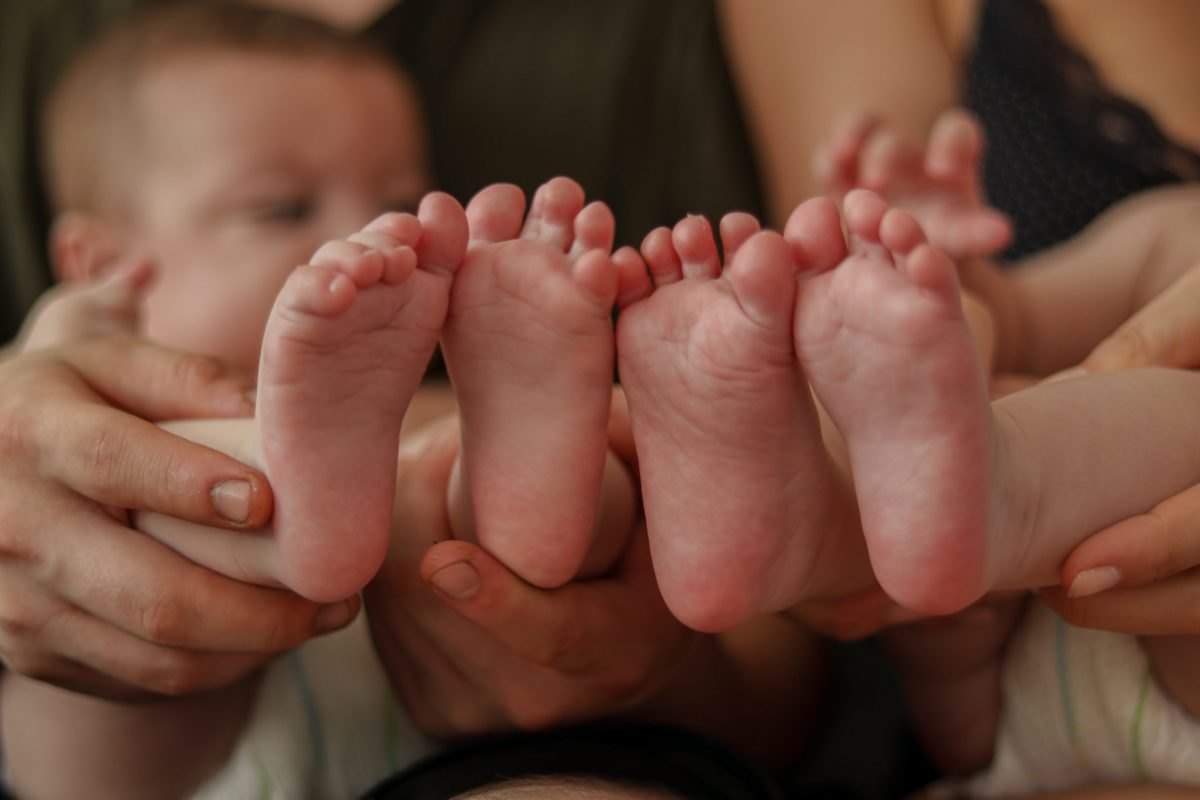Life with Twins: 5 Tips & Tricks for the First Three Months
Taking care of twins can be a tremendous challenge. It’s twice as many diapers, twice as many feedings, and twice as much laundry! You do also get double the giggles, double the gummy smiles, and double the baby snuggles! We talked to dozens of caregivers of multiples, both parents and professionals, about what life with newborn twins in the mix looks like, and the same key pieces of advice emerged again and again.
Here are five things you should plan on doing before your twins arrive. (If they’re already here, don’t stress. You can still use this great advice, too!)
1. Establish an Eating, Sleeping and Playing Schedule for Twins
First of all, getting the babies on the same schedule is paramount for your survival. Infants need to eat sometimes every two hours in the beginning, which necessitates diaper changes at least that often. Aside from eating and voiding, their other main need is sleep! Newborns can sleep 18 or more hours a day in the beginning, and syncing up the times your little ones are asleep is the only way you’ll have time to wash all those bottles and grab a bite to eat yourself!
Putting the babies on an eat, play, sleep, and repeat schedule will help get them used to eating at the same times daily and their bodies will begin to expect food at those intervals. Once the babies have eaten, they have a period of awake time where they play, practice tummy time, and interact with their caregivers while their milk digests a bit. Before long, they’ll be going down for a rest before it’s time for a feed again. In the beginning, their awake periods will be brief, usually no more than an hour at a time to fit in both feeding and play time.
TIP — By structuring play time in between feeding and sleeping, you can avoid pitfalls down the road that arise from babies feeding in order to sleep.
2. Record Feedings, Diaper Changes, and Sleeping Schedules
Secondly, choose a centralized way to record all of your little ones’ feedings, diaper changes, and sleeps. Whether you prefer an old-fashioned journal or a high-tech app, you will want to record who has taken in what amount of milk, and whose diaper has been dirty when. Your sleep deprived brain will not be able to remember who the soiled diaper you changed an hour ago belonged to, so it’s better to have somewhere to log it — at least in the beginning while you get the schedule solidified.
TIP — Jot down any bouts of gassiness, spitting up, etc. so that you have a central place of recorded instances in case you need to consult a pediatrician. This will help you ask questions and get helpful answers to some of the most common health issues infants experience, such as reflux or milk intolerance.

Photo by Kübra Kuzu
3. Identifying One Twin from Another
We also recommend choosing a way to tell the babies apart from each other. Even fraternal twins can often look a lot alike, especially in the beginning. And when it’s the middle of the night and you’re not sure who you’ve just fed, having a quick way to confirm is a lifesaver. Here are a few ideas:
- Natural Characteristics — Sometimes there will be an easy to identify marker on the baby already, such as a birthmark or skin blemish, or if you have boy-girl twins, a quick diaper peek will suffice.
- Clothing Choices — Others choose to dress one twin in solids and the other in patterns or one twin in blue and the other in green, etc., but this only works once they’re already dressed.
- Toe Polish or Ankle Bracelets — When both babies have just had a diaper blow out or spit-up mishap and a midday bath just became your new plans, all bets are off! Many families prefer something that stays on the baby’s body, such as putting a bit of polish on the baby’s big toenail in a color coordinated way, or utilize hospital-style bracelets around the babies’ ankles.
TIP — Whatever method you choose, make sure you share it with everyone who is caring for the babies. It can be easy to forget which twin you have when both babies are sounding off at once!
4. Accept Help — To Get Through the Tough Times & Enjoy Your Twins Alongside Others
Finally, the fourth most common piece of advice on managing twins — and perhaps the most important one — is to accept help early and often. Twins can be an amazing adventure but they are also a lot of work. As one twin mom put it to me, “everyone always says I got two babies for the price of one because they came at the same time. But only parents who don’t have twins would say that, because it’s definitely two for the price of two!”
Family & Friends Enjoy Helping With Twins
The burden of caring for two babies can be large, but your family and friends want to help. Utilize meal train websites like mealtrain.com or caregiving coordination websites like lotsahelpinghands.com for coordinating the help your friends and family are offering.
Redirect Offers to Help
And don’t be afraid to turn down the help you don’t want. Yes, everyone wants to hold the babies, but in the middle of flu season, what you may need more is someone to come fold laundry twice a week, drop off a meal, or run an errand. Put it out there, and give others the opportunity to show up for your family in its transition time of adding twins to your family.
5. Enlist the Help of a Professional Newborn Care Specialist
Sometimes the best help comes from a trained professional, such as a newborn care specialist or postpartum doula — someone you can count on to do things exactly as you like them. (And no hurt feelings involved for declining to do what Grandma Mary did to get her babies sleeping in the 70s.)
As one twin dad put it, “Having the help of a postpartum doula was the single best decision we made in caring for our twins as infants.” He said, “we knew when she came that we were going to get some continuous sleep, and we didn’t have to worry about the babies because they were in the hands of someone who knew way more than we did anyway. She helped us get the twins on a good schedule and sleeping on their own. Plus, she even figured out one of our boys wasn’t tolerating his formula before we even noticed it was a problem.”
Including professional help in your care plan for your twins can help ensure that you get the sleep you need, while having the support you need to start your life with two babies on the right footing. Postpartum doulas are trained in all aspects of newborn care, postpartum care, and are experienced and skilled caregivers of infants, with specific training to care for multiples.
Have More Questions About Twins & Caring for Multiples?
Reach out to us to learn more about how our team of postpartum doulas and newborn care specialists can help you and your family. And, if you’re expecting or balancing life with twins, triplets (or more!), you can purchase our video class on caring for multiples.

